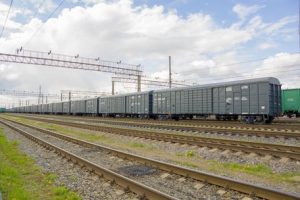 UWC has completed the delivery of 100 Tikhvin-box cars to the fleet of Kuchukterminal company, part of LTB international logistic group.
UWC has completed the delivery of 100 Tikhvin-box cars to the fleet of Kuchukterminal company, part of LTB international logistic group.
The 11-6874 box car is designed to transport a wide range of unit and bulk cargoes with an increased capacity of 73 tonnes and an increased body volume of 175 m3. The design of the box car makes possible to increase the car load by more than 7%, by 5 tonnes of cargo.
The car design uses ergonomic solutions which render its operation more convenient such as the checker floor plates, facilitating better traction of the loader’s wheels in the course of cargo handling operations, and lash slings to simplify cargo securing inside the car.
The box car is equipped with 18-9855 bogies with an axle load of 25 tonnes, providing additional advantages because it extends the maintenance interval up to 1 million km, or 8 years. The service life of the railcar is 32 years.
The car’s inner side walls are fit for installation of nondetachable equipment, as well as a non-detachable device to facilitate opening the doors.
Dimensions of the doorway enable cargo loading and unloading with all existing types of forklift trucks. A reliable door locking mechanism ensures the cargo safety. The railcar has various design options such as those with upper and lateral loading hatches which contributes to a quicker and simpler loading of bulk cargoes.
The delivered Tikhvin-box cars increase Kuchukterminal existing fleet to 220 units mounted on 25-tonne axle load bogies. Since 2017, the TikhvinSpetsMash facility in Tikhvin is manufacturing the cars for the company. Our company is developing rapidly. We have been putting consistent effort into increasing our cargo fleet, in which box cars, including new generation cars manufactured in Tikhvin, represent a significant share,” said Dmitry Bychkov, Head of box car division at Kuchukterminal.
In 2017, Kuchukterminal ordered the first 20 box cars.
UWC says that the demand for box cars will increase due to the decommissioning. By 2022, more than 5 thousand units will be removed from service, accounting 8% of the existing box car fleet.
Share on:



